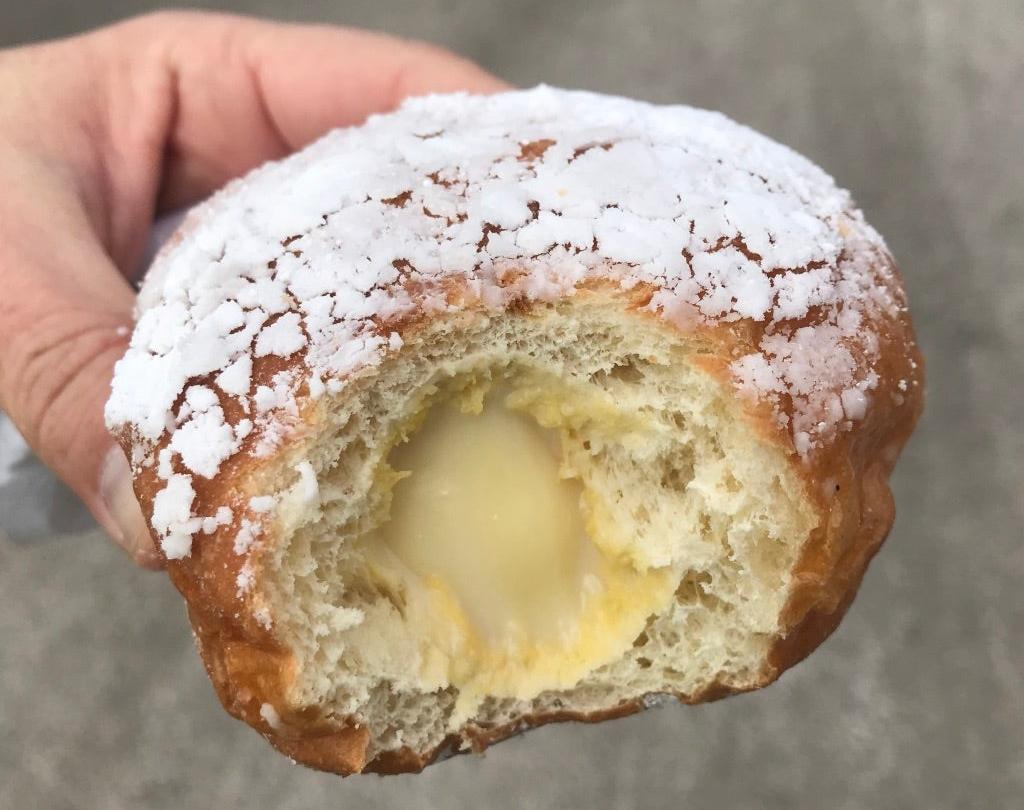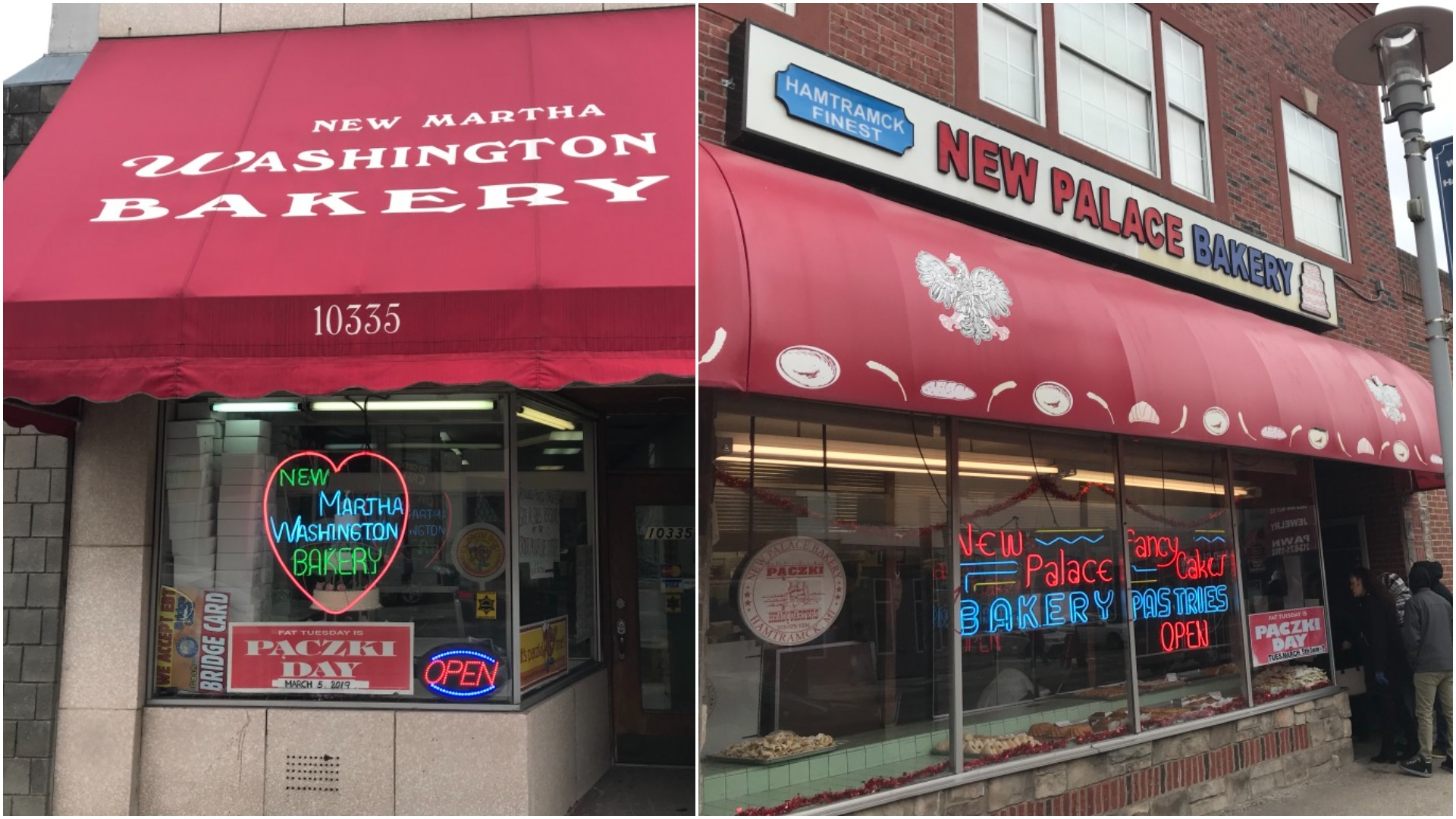Pączki Day's Past, Present, And Pronunciation
Fried Polish pączki are a Fat Tuesday staple—and you'll want to order ahead.
Of the nation's roughly nine million Polish Americans, the overwhelming majority remain settled in large Midwestern cities such as Chicago, Cleveland, and Milwaukee. But nowhere do Polish traditions and culture reign larger than the Poletown neighborhood of Detroit and the adjacent city of Hamtramck. A burg of fewer than 30,000 people, Hamtramck is renowned for its Polish bakeries and, more specifically, the Polish pastries celebrated annually on Shrove Tuesday, also known as Fat Tuesday or Mardi Gras—and solely referred to locally as Pączki Day.
What are pączki?
You might be forgiven for calling a pączek—that's the singular form, pronounced "pon-check"—a jelly doughnut, but not around here. It's not just that pączki (the plural form, pronounced "poonch-key") are popular in Hamtramck, they're a way of life. Despite their origins as a treat specifically made for the day preceding the forty days of Lent, pączki can be found year-round at Hamtramck institutions such as New Palace Bakery (established 1908) and New Martha Washington Bakery (opened 1925). In the modern era, Pączki Day has virtually been extended to a weeklong fête.
Pączki Day festivities kick off with a 5K Pączki Run all through Hamtramck (which is only 2.1 square miles). Finishers are treated to table after table of sweet pączki stuffed with all manner of traditional fillings such as prune jam, raspberry jam, Bavarian cream, buttercream, or even one made with rose hips. More contemporary and increasingly newfangled flavors range from beer-and-pretzel to bacon-butterscotch.
All day long, lines snake around the corner at New Palace, New Martha Washington, and other bakeries and markets where customers buy these fat, fried, doughy pockets of jam or cream by the dozen. By night, greater Detroit area bars such as Small's in Hamtramck sell vodka-infused Pączki Bombs, the most caloric way imaginable to get your drink on.
For those who want all the flavor of a pączek bomb without the carbs, Detroit City Distillery makes a limited-run vodka using New Palace Bakery's raspberry pączki, plus nearby breweries including Detroit Brew Works and Baffin Brewing make pączki stouts sacrificing dozens of the stuffed treats in each batch.
Where did pączki come from?
The genesis of the treat, quite similar to several other doughnut-style delicacies, is that Christian households have traditionally been called upon to rid their pantries of rich ingredients forbidden during Lent, the 40-day season leading up to Easter Sunday. Today we tend to think of only giving up meat for Lent, but historically the verboten vittles included fat, eggs, sugar, and fruits as well.
To ensure these perishable, prohibited ingredients were used up before Ash Wednesday, Fat Tuesday became a day of gluttony, and all those cherished items were crammed into one delicious snack. In Portugal, they're called malasadas. Austrians make krapfen. In Poland: pączki, a name that translates to "little packages."
Where to buy pączki in Hamtramck
Fidanka "Vicky" Ognanovich is the matriarch of the family that has owned New Palace Bakery for nearly fifty years since her father bought it. Her daughter-in-law, Suzy Ognanovich, says that the recipe today is identical to the one the family inherited with the bakery, save for one distinction: the pączki are now made with vegetable shortening instead of lard.
Pączki Day requires a week of all hands on deck—everyone in the family and as many friends as they can round up—making and filling the treats. Ognanovich is partial to custard pączki when performing the arduous task of quality control.
On Pączki Day proper, doors open at 3 a.m. As lifelong customers stream through the doors past neon signs advertising the bakery's "fancy cakes" and other pastries, all anyone's buying are boxes of pączki, usually a pre-packed mixed dozen of raspberry, blueberry, and lemon, or, increasingly, a pre-packed specialty dozen with flavors like PB&J, triple chocolate, and a new one to mark Hamtramck's hundredth birthday, Centennial Brew coffee cream. The older Poles are the ones buying straight prune-filled by the half dozen.
Suzy Ognanovich happens to be of Macedonian descent. Two blocks down Joseph Campau Avenue in Hamtramck at New Martha Washington Bakery, Sunca "Sandy" Bakic and her family run the Polish bakery, which her Serbian family purchased in 1973. She said she's read the bakery's original, handwritten recipe for pączki (part of the limited Polish she understands), which they still use. Like New Palace, New Martha Washington swaps lard for shortening.
Two more blocks up is Srodek's, a Polish market and delicatessen, while a few blocks farther is Al-Haramain International Food, a Yemeni market (they use the word "bazaar") that carries goods not just from the Middle East but items common on shopping lists of people from Africa, Asia, and Latin America.
That's because fifty years ago, some 90% of the city's population was Polish. Today that's down to only about 7%. In fact, the enclave is deemed Michigan's most diverse city, thanks largely to its Yemeni, Bangladeshi, and Bosnian immigrants and refugees. It even boasts a sizable number of cultural and religious Chaldeans (Detroit has the largest Chaldean population outside of Iraq), although since Chaldea ceased existing circa the sixth century B.C.E., it's almost as if a metro area counted its Mesopotamian-American or Babylonian-American populations.
While most health-conscious folks turned away from animal-derived lard decades ago, that's not the main reason these local bakeries don't use the fat for frying pączki anymore. Instead, it's the fact that many of the shops' modern-day customers are Muslim. Customers speak a variety of languages, including English, Kurdish, Bengali, Arabic, Aramaic, and Bosanski.
"There are over 32 languages spoken in Hamtramck," said Bakic, "probably more now."
The multicultural, polyglot people of Hamtramck all welcome neighbors, Michiganders, and tourists from afar to partake in Pączki Day.


